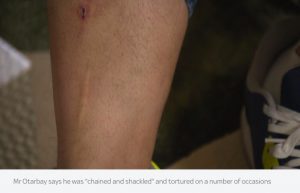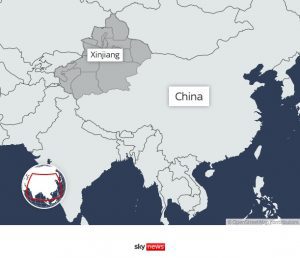The British government has been accused of “dragging its heels” over trade linked to forced labour.
A Chinese labour camp survivor is preparing to sue the UK’s trade secretary for allowing cotton imports from the western Chinese province of Xinjiang, where it has been alleged local minority groups such as the Uyghurs have been subjected to human rights violations.
Erbakit Otarbay has spoken out despite warnings it could put his family in danger.
His lawyer, Paul Conrathe, says it is “outrageous” that the UK government is “hiding behind manifestly inadequate legislation”. The former leader of the Conservatives, Sir Iain Duncan Smith, says the UK is “lagging behind other countries”.
Mr Otarbay, who is Chinese but ethnically Kazakh, was forced to work in a clothing factory after being arrested in Xinjiang in 2017. He has written a pre-action letter to Trade Secretary Kemi Badenoch, demanding she address the “ongoing failure” of the UK to impose any restrictions on cotton imports from the region.
He says: “I’m lucky I’m in a free country now. But I can’t not think about people who I left behind. I don’t know what happened to them, what kind of horrors they have been subjected to.”
Mr Otarbay was sent to a detention centre in Xinjiang after being accused of watching illegal videos on Islam and installing WhatsApp on his phone. He says he “wished he died quickly”, and was “chained and shackled” and tortured, on a number of occasions, until he passed out.
Over 280 organisations, including the Global Legal Action Network (GLAN), are also calling for all products from Xinjiang to be removed from supply chains.
They said “virtually the entire UK apparel industry” is at risk of being linked to forced labour.

Ban on all cotton products from Xinjiang
Last year the US announced an import ban on all cotton products from Xinjiang; firms also have to prove any imports from the region are not produced using forced labour.
UK companies above a certain size must show they are avoiding using slavery in their supply chains. But there is currently no penalty if they fail to do so. A coordinated campaign is being launched in Ireland, where EU rules have also been criticised for not being strong enough.
Sir Iain said the UK is “very closely linked” to slave labour, and the government needs to make clear companies face “serious penalties” for not declaring where they are getting their goods from.
He said the UK “led the world” with the Modern Day Slavery Act, but “the key Achilles heel to our bill is that we need to have companies taking full responsibility for their supply chains”.
Earlier this year the United Nation’s human rights office said China’s treatment of its Uyghur population “may constitute crimes against humanity” and last December a tribunal in the UK found China guilty of genocide against the Uyghur people in Xinjiang.
China has always denied human rights violations. The government insists that the camps – which for a long time it denied even existed – are vocational training centres and part of a programme to fight extremism.
‘We approve of forced labour products’
Twenty percent of the world’s cotton is grown in Xinjiang, according to Laura Murphy, a human rights professor at Sheffield Hallam University in the UK. She says not strengthening the UK import rules is “tantamount to saying we approve of forced labour products entering into our borders”.
In a statement, a government spokesperson said: “The evidence of the scale and severity of human rights violations being perpetrated in Xinjiang against Uyghur Muslims paints a truly harrowing picture which we absolutely condemn.
“The UK is absolutely committed to tackling the issue of Uyghur forced labour in supply chains and we have taken decisive action.
“Over the last year, we have introduced new guidance on the risks of doing business in Xinjiang as well as enhanced export controls, and have committed to introduce financial penalties for organisations that do not comply with modern slavery reporting requirements.”

